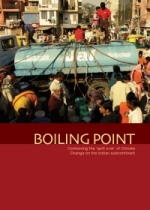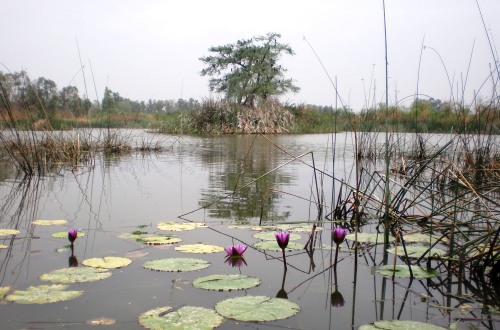/sub-categories/people-and-organisations
People and Organisations
Estimation of replenishable groundwater resources of India and their status of utilization - A research paper by CGWB
Posted on 19 Apr, 2010 09:49 PMThe paper describes the methodology used in the groundwater resource estimation and the results of the latest country-wide assessment. In India, dynamic groundwater resources are estimated jointly by the Central Ground Water Board (CGWB) and State governments at periodic intervals. The latest estimates of dynamic resources are based on groundwater resource estimation methodology-1997 (commonly known as GEC-1997). These estimations are widely used in formulating various groundwater development and management plans. The paper also discusses future strategies on groundwater resource estimations.
Rainwater harvesting in Mumbai: Application of GIS
Posted on 19 Apr, 2010 07:36 PMThis blog post by Prakash Apte, draws attention to the increasing water demand in urban areas because of industrialisation and population growth by giving the example of Mumbai and points at the current scenario of the lack of availability of adequate and safe water supply to meet the needs of the ever increasing population in the city.
The author proposes that rainwater harvesting can be a viable solution in cities such as Mumbai to meet this increasing demand for water and can provide an opportunity for equitable, efficient and sustainable use of water resources.
There is an urgent need for evolving a rainwater harvesting system that is sustainable, replicable and economically viable and argues that the benefits of using rainwater harvesting can lead to a range of social, economic and environmental benefits and can contribute substantially to improving the quality of life in Mumbai.
Geographic Information Systems (GIS) has a role and application, in promoting a system and methodology for rain water harvesting and for providing the data needed to enable its large scale implementation in the context of Mumbai.
Boiling Point: Containing the spill over of climate change in the Indian subcontinent - A report by Sustainable Environment and Ecological Development Society (SEEDS)
Posted on 08 Apr, 2010 02:07 PM The report ‘Boiling Point’ by Sustainable Environment and Ecological Development Society (SEEDS) discusses the impact of climatic changes at the global, national and local level on the environment and on the current survival, food, water security issues and livelihoods of communities in India.
The report ‘Boiling Point’ by Sustainable Environment and Ecological Development Society (SEEDS) discusses the impact of climatic changes at the global, national and local level on the environment and on the current survival, food, water security issues and livelihoods of communities in India.
The report highlights the problems faced by a number of communities from the different parts of the country by presenting case studies that describe how climatic changes have influenced local livelihoods and survival needs of communities with the marginalised and the deprived being the most affected. The report presents a few case studies that illustrate how people have coped with these problems by finding out appropriate, locally relevant and sustainable solutions.
The report recognises that identification of positive efforts made by individuals or groups of people through the case studies can be one such step towards triggering a discussion and educating the people on the seriousness of the situation and making them realise of the urgency to act fast. The report identifies the need for advocacy and educational efforts based on the bottom up approach involving the grassroot level that can lead to building up of pressure for the need to bring about changes at the policy level.
Environmental issues, law and technology An Indian perspective
Posted on 19 Mar, 2010 02:15 PMDue to emphasis on Environmental Education, the subject is being taught at all levels of education. It is indeed pleasure to see technology students of all branches are being taught with the subject in first year. The Environmental issues and law varies from country to country and is unique to India. Understanding the issues does need lot of research and study ma
The wells brim with water in drought-prone Gujarat
Posted on 19 Mar, 2010 09:20 AMTHE WELLS of Kalawad village in Junagadh district, Gujarat brim with water. The reason — construction of check dams by a peasant, Mr.
The Vand women of Kachchh - A case study on drinking water management from the work of Samerth Trust in Kutch, Gujarat
Posted on 07 Mar, 2010 02:23 AMThis case study is about Samerth's efforts to achieve drinking water security, in participation with local village communities in Rapar, Kachchh (Gujarat). Arghyam has been collaborating with Samerth on this effort since 2007.
The Vand Women of Kachchh: Guest post by Keya Acharya
She gazes unflinchingly with direct eyes into the camera with a feminine mystique and physique that could, be gracing the front cover of a beauty magazine. Her red, mirror-worked blouse, in the traditional Kachchhi style worn by tribal women, is strapped at the back in stringed bows, greatly practical in the dry, wilting heat of that arid expanse of land in hinterland Gujarat called Kachchh. Her skirt is a colourful hue of printed green, and her ‘dupatta’ is a blazing red piece of cloth swept forward from her waist, partially covering her back, brought over her head and tucked back demurely into her waist again. Her name is Ammi.
Branches of ATREE (Ashoka Trust for Research in Ecology and the Environment)
Posted on 22 Feb, 2010 12:43 PM
Ashoka Trust for Research in Ecology and the Environment
The last quarter of 2009 seems to have been really productive as far as our work goes - a new office in Sikkim, the number of people we have had the opportunity to share ideas with - starting from the International Canopy Conference to lectures by visiting faculty, and moving on to some interesting workshops and events planned for 2010. An invitation to celebrate World Wetlands Day at Yamuna Biodiversity Park on 2 FebruaryPosted on 02 Feb, 2010 03:10 PM
The Yamuna Biodiversity Park (YBP) invites all citizens to celebrate the World Wetlands Day on the 2nd of February. This date marks the signing of the ‘Convention on Wetlands’ in 1971 at Ramsar, Iran. The 2010 Wetlands Day theme is “Caring for Wetlands – an Answer to Climate Change”. The theme highlights the fact that wetlands, with their biodiversity, can help mitigate climate change. Letter from Rajendra Singh to Jairam Ramesh to withdraw environmental clearance to Athirappilly projectPosted on 14 Dec, 2009 10:27 AMPlease see the letter addressed to Jairam Ramesh by Rajendra SInghji on Athirappilly Issue when he visited the river and the dam site on the 8th December. To read the letter Click Here. Sevabharati Karnataka - Information on the organisationPosted on 27 Oct, 2009 05:37 PMSevabharati Karnataka is one of the organisations working on relief work. They are planning to build 2349 homes at a cost of Rs. 1 Lakh each in 19 villages across 7 affected districts. More information is available at their site: http://www.sevabharatikarnataka.org Pagination |
 Branches@ATREE
Branches@ATREE